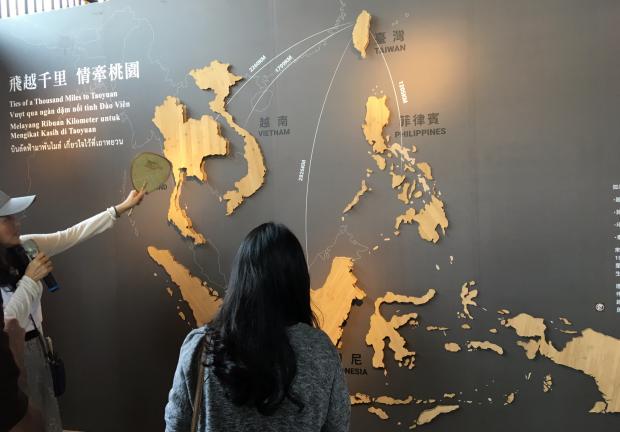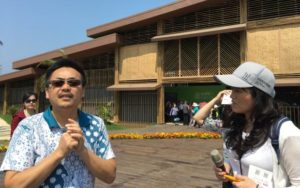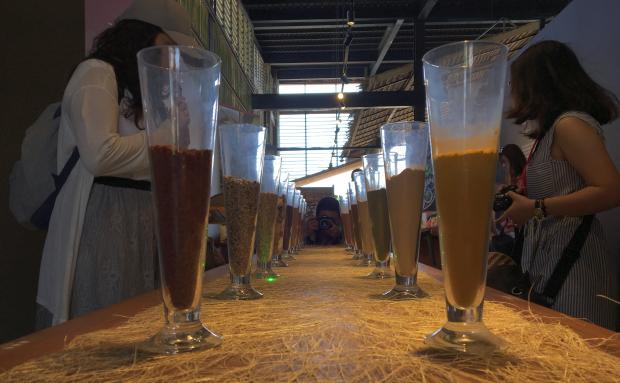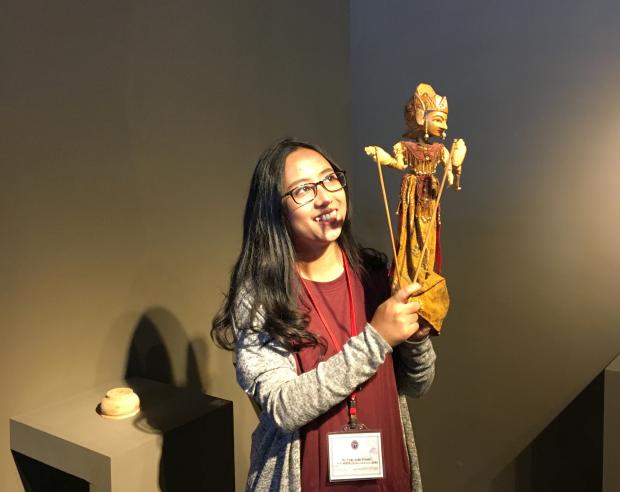Taiwan exhibit showcases migrant cultures, including that of Filipinos

A map shows the distance that migrant workers in Taiwan travel from their Southeast Asian homelands. (Photo by VINCE F. NONATO / Philippine Daily Inquirer)
TAOYUAN, Taiwan — This Taiwanese city’s agricultural exposition has dedicated an exhibition to the culture of Filipinos and other Southeast Asians, in a bid to inform its citizens about its migrant population.
The VIPT (Vietnam, Indonesia, Philippines, Thailand) Agriculture Pavilion is one of the features of the 2018 Taoyuan Agricultural Expo, which runs in the Xinwu district of Taoyuan City until May 13.
Speaking through an interpreter, exhibit designer Chen Pao-tzu said it was meant for the Taiwanese to learn about the cultures of Southeaast Asian nations whose citizens make up a substantial part of the island’s labor force.
“If we don’t get to know your culture, we cannot live together more happily. That’s the reason why we created this pavilion – to make the people from our countries work in harmony,” Chen told a group of Indo-Pacific journalists invited by the Ministry of Foreign Affairs to visit Taiwan recently.

Exhibit designer Chen Pao-tzu take a group of eight journalists from Indo-Pacific media outfits, including the Philippine Daily Inquirer, on a tour of the VIPT Agriculture Pavilion, whose shape is inspired by Southeast Asian rice terraces. (Photo by VINCE F. NONATO / Philippine Daily Inquirer)
There are roughly 150,000 Filipinos in Taiwan, mostly working in the manufacturing sector, with a few thousand either working as caregivers or hospital staff or marrying Taiwanese.
Article continues after this advertisementIndonesia and Vietnam have more nationals in Taiwan, around 250,000 and 200,000, respectively.
Article continues after this advertisementTaoyuan is one of the major destinations for migrants.
On display are the countries’ agricultural staples (rice and other grains, bamboo, Manila hemp, spices), traditional kitchenwares (such as plates and coconut shell cups), festivals, farmers’ hats, and games.
Puppetry from Indonesia and Vietnam is also featured, with one of the Indonesian puppets held by no less than President Tsai Ing-wen when she visited the exhibit, according to a guide.
But, there are some curiosities in the tour, with the terraces being referred to as “ladderlands” and figurines of the Santo Niño, the Christ Child, being described as “Philippine craft dolls.”
Taiwan has been generally welcoming of migrant workers, but the need is more pressing for the agricultural sector as the median age of farmers is 62 years old.
“If the people of your country want to take this vocation and experience, you are welcome,” Evelyn Hsiao-Chien Chou, an officer of the Council of Agriculture’s Department of International Affairs, said. /atm

Figurines of the Santo Niño, the Christ Child, are described in the exhibit as “Philippine craft dolls.” (Photo by VINCE F. NONATO / Philippine Daily Inquirer)

Spices are displayed in the pavilion. Such bounty made the Europeans colonize the islands of Southeast Asia. (Photo by VINCE F. NONATO / Philippine Daily Inquirer)

Indonesian reporter Nicky Aulia Widadio shows how to use a puppet. The puppet was held by no less than President Tsai Ing-wei when she visited the Taoyuan Agricultural Expo, according to a guide. (Photo by VINCE F. NONATO / Philippine Daily Inquirer)

Schoolchildren visit the VIPT Agriculture Pavilion to learn about Southeast Asian culture. The VIPT countries account for a major share of the migrant labor force, which Taiwan has welcomed with open arms. (Photo by VINCE F. NONATO / Philippine Daily Inquirer)